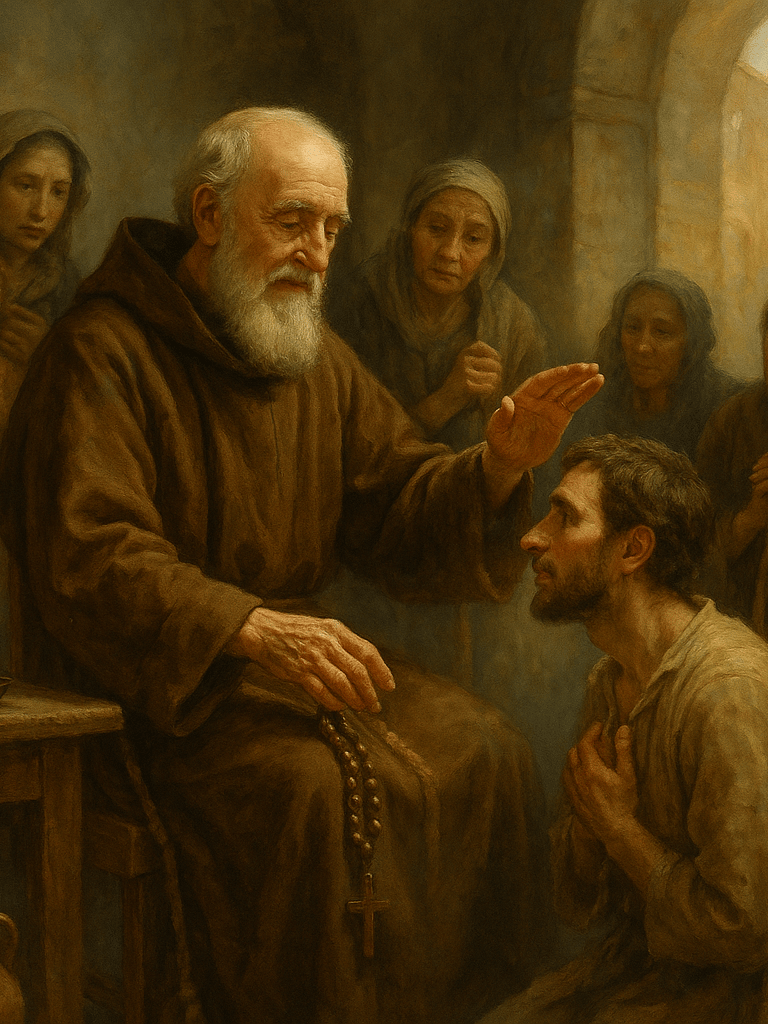Saint Pacific of San Severino – The Patient Servant of God
Feast Day: September 24 | Patronage: San Severino Marche, those suffering chronic pain, patience in illness
Halo & Light Studios
9/24/20253 min read


Click Link for a reel of Daily Dose of Saints and Faithful Art:
https://youtube.com/shorts/TA1XzBdPGdo
Fellow Pilgrims in Christ,
When we think of saints, we often imagine bold missionaries or miracle-workers crossing oceans. Yet sometimes holiness is revealed not in action, but in patient endurance of suffering. Such was the life of Saint Pacific of San Severino, a humble Franciscan friar who bore the cross of sickness with extraordinary faith and left behind a legacy of miracles.
Born Carlo Antonio Divini in 1653 in San Severino Marche, Italy, Pacific’s childhood was marked by loss. Orphaned at the age of three, he was raised by his uncle, the cathedral archdeacon, who provided him with both education and spiritual grounding. At seventeen, he entered the Franciscan Reformati, choosing the religious name Pacificus—a title that would foreshadow the peace with which he endured suffering.
Ordained a priest in 1678, he taught philosophy to young friars and preached missions throughout the Italian countryside. For a time, he even served as guardian of his convent, remembered as both wise and gentle.
Pacific’s missionary work was cut short when illness struck. Over time, he lost the ability to walk with ease, became nearly deaf, and eventually went blind. By earthly standards, his life should have been reduced to silence and pain. Yet in this infirmity, Pacific became a contemplative soul, immersed in prayer, joy, and resignation to God’s will.
His very presence consoled visitors. Those who came to him did not see defeat but serenity. His sufferings became a living sermon, preaching patience better than any words could.
Even while confined by illness, Saint Pacific was known for extraordinary gifts:
Prophecy and Counsel: He often read the hearts of those who came to him, offering advice and warnings that later proved true.
Healing: The sick and afflicted sought his prayers, and reports of cures multiplied—strength returned to the weak, health restored to the suffering.
Mystical Graces: He experienced ecstasies, sometimes lifted into prayer so deeply that he seemed lost to the world around him, a living witness of union with God.
Miracles after Death: Pilgrims visiting his tomb reported healings and spiritual conversions, fueling devotion that spread beyond San Severino.
Pacific lived during the late 1600s and early 1700s, a time of both renewal and struggle in the Catholic Church. The Franciscan Reformati sought to reclaim the strict poverty of St. Francis, emphasizing prayer and penance. Meanwhile, Europe was shifting with wars, dynasties, and Enlightenment thought. In this restless world, Pacific’s hidden life of suffering stood as a counter-witness: holiness could be achieved not through worldly triumph, but through humble fidelity to Christ.
Saint Pacific died on September 24, 1721. His cause for canonization began less than twenty years later, and his reputation for miracles grew. He was beatified by Pope Pius VI in 1786 and canonized by Pope Gregory XVI in 1839. Today, his feast is celebrated on September 24, and his relics are enshrined in San Severino Marche, where he is venerated as the city’s heavenly protector.
Saint Pacific invites us to see suffering not as failure, but as a hidden school of holiness. In his blindness, he saw God more clearly; in his deafness, he heard the Spirit more deeply; in his lameness, he walked the way of the Cross.
If St. Pacific lived today, he would not be famous for grand projects or movements. He would be a hidden saint in our midst, teaching that joy and holiness can blossom even in the soil of suffering. His life would be a quiet revolution against despair, reminding us that every moment of pain, offered to Christ, becomes a fountain of grace for the whole Church.
May we, too, learn to embrace life’s trials with trust in Christ, believing—as Pacific did—that patience in suffering becomes a miracle of grace in itself.
“What gives true peace is not to be without suffering, but to endure tribulations and adversities for the love of Christ.” – St. Francis of Assisi


